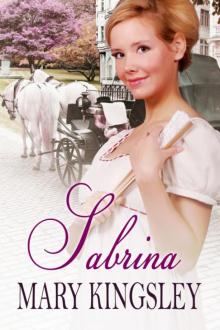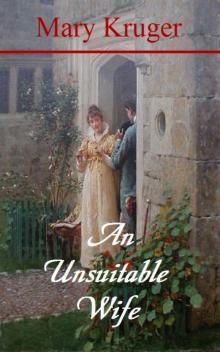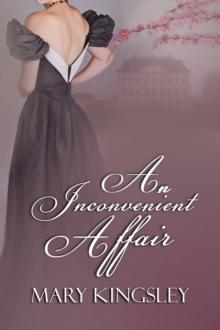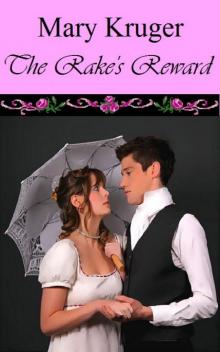- Home
- Kruger, Mary
Rogue's Charade
Rogue's Charade Read online
Rogue’s Charade
by Mary Kruger
Smashwords Edition
Copyright 2011 Mary Kruger
Smashwords Edition, License Notes
This ebook is licensed for your personal enjoyment only. This ebook may not be re-sold or given away to other people. If you would like to share this book with another person, please purchase an additional copy for each recipient. If you’re reading this book and did not purchase it, or it was not purchased for your use only, then please return to Smashwords.com and purchase your own copy. Thank you for respecting the hard work of this author.
Cover Art copyright 2011 Princess Pages
Chapter One
It was a fine day to die.
Standing in the tumbril as it trundled along London’s roughly paved streets, Simon Woodley swayed to keep his balance, inside and out. London was enjoying an uncommonly fine summer’s day, he thought detachedly, studying the crisp blue sky that arched overhead, dotted here and there with billowy fair weather clouds. For weeks, months, he had languished in Newgate without a sign of the sky. Now it seemed as if that patch of blue would be the last thing he’d ever see.
For the tenth time he tested the bonds holding his wrists behind his back; for the tenth time they held firm, testimony to his jailor’s thoroughness. Oh, they weren’t about to let him go, not him. He was an itinerant actor, found standing over the body of a respectable Canterbury merchant, money bag in one hand and dripping knife in the other. The trial had been swift, the judgment final: death by hanging. Simon grimaced at the thought, swallowing against a persistent lump in his throat. He’d thought little of death; at eight and twenty, why should he? But when he had considered it he’d seen himself elderly, able at last to play the fine Shakespearean roles youth denied him, Prospero or Macbeth or even Lear. There were also those who thought he’d meet his end at the hands of a jealous husband, but—ah, well. If he had loved not wisely, at least he had loved well. He regretted now that he hadn’t done so more often.
Oxford Street was becoming more congested as the procession neared Tyburn. There were other tumbrils behind his, for hanging days were held only eight times a year, a cause for public holiday. Behind the tumbrils rolled hearses, black as night, and the mourning wagons. The condemned had had their final service in Newgate chapel, in an enclosure that contained a symbolic coffin; the procession had stopped at St. Giles to give the convicted their traditional last drop of beer, before facing the last drop of the gallows. In the distance tolled the deep, doleful bell of St. Sepulchre’s church; ahead there was nothing but the scaffold.
Assuming a pose of cool indifference, face blank, shoulders relaxed, Simon surveyed the crowd that lined both sides of the street. Looked like his death would draw more of an audience than his appearances on stage ever had. The crowd was a motley collection of urchins and streetwalkers and respectable tradesmen, all come for the spectacle of a public hanging of a vile murderer. Him. And though he’d committed many a sin in his life, he wasn’t certain he deserved this.
Deep in the crowd, pressed close against a rickety half-timbered building and huddling under the overhanging eaves, walked a woman. There was nothing remarkable about her that he could see; she was dressed in a gown of some greenish stuff, with a laced bodice and a white shift beneath, and a neat cap hiding her hair. Young, though, if he were any judge, and passably shapely, and yet that wasn’t what was so unusual about her. In this crowd of leering, jeering taunting spectators, she was the only one not watching him.
The tumbril had slowed to a crawl, its progress impeded by the press of people. From the corner of his eye he could see scaffolding in the distance, and he turned his head sharply, watching the woman as she made her slow progress against the crowd. Anything to keep from thinking of what lay ahead; anything to stay upright, strong, shoulders braced, as if nothing much mattered. And the woman intrigued him, because no matter how much the crowd yelled, no matter how she was pushed or jostled, she simply would not look at him.
Turn your head, he commanded silently, staring at her, turning on the full force of his will and his charm, as he did when he faced an audience across the footlights. It was power, to hold the emotions of an audience in sway, to make them sigh or laugh or gasp. Occasionally, though, there would be one person who wasn’t convinced, one person who would sit back, arms crossed, daring him. Daring Simon to make him believe that the words he spoke were real and not the product of a skilled playwright. They were his challenge, those people; they were the ones he played to, and when he saw the dawning belief in their eyes, when he knew he’d won them over he felt joyous, powerful, able to do anything. He wanted to see that look now on her face, to know that she believed in the role he played so hard. He wanted it to be the last thing he remembered when the noose was slung around his neck.
The tumbril came to an abrupt, jolting stop, and Simon lost his balance. Unable to catch himself, because of his bound hands, he pitched forward, stumbling to his knee. “‘Ere, now, wot you think yer doin’?” Craddock, his guard, demanded, and grabbed Simon’s arm, jerking him roughly to his feet. “You’ll not escape us. Not with that”—he nodded—“awaitin’ you.”
He wouldn’t look. Simon knew if he did, he’d be lost. But he’d been caught off guard, forcibly reminded that he was a prisoner, and as he straightened up he saw it. The scaffold, with its stairs leading up. The gallows. And, finally, the gibbet, from which hung a new hempen rope, tied in the intricate coils of a noose. For him. The knowledge slammed into his gut, and in that moment his pose, his poise, deserted him. In that moment, the woman in green, caught in the midst of the crowd, looked up.
Ah, but she had a face like a flower, eyes the blue of the sky and features as delicate and precise as a cameo. She was his salvation, something to distract him from the horrors ahead. Strands of hair escaped in wispy curls about her cheeks and trembled against her lips, full and pink and parted. In dismay? He didn’t know. He knew only that she was seeing what everyone else in the crowd saw, a convicted felon, a desperate murderer, about to meet his Maker. And that, God help him, was not how he cared to be remembered.
It wasn’t easy. Not with the image of the gibbet swaying before him, not with the thought of the long walk up the staircase and the short drop into eternity. Difficult, but he’d played to hostile crowds before. Slowly he gathered the remnants of his role about him: legs outspread in a wide, confident stance; shoulders braced and broad; and his head up, with just the faintest hint of a disdainful, mocking smile upon his lips. By God, he’d done it, he almost felt that way again, brave, defiant, and because of that, because the woman continued to stare, her eyes wide and distressed and startled, he did something quite in character with his role. He winked at her.
She wasn’t going to look. Blythe Marden kept her eyes determinedly ahead and her shoulders hunched, turned away from the spectacle unfolding to her left. A hanging. The thought made her shudder, and yet the crowd about her was in holiday mood, as if a man’s death was something to be celebrated. They chattered and laughed, hoisting children to their shoulders to gain a better view, carrying baskets of food and jugs of ale, quite as if they were going on a picnic. And all the time the tumbril trundled slowly on, the man it carried standing tall and straight and proud, scornful of the racket going on about him. He was a convicted murderer, that Blythe knew, and so probably deserved to die; but even so she would not shame him by staring at him like some exhibition in a zoo.
A man pushed ahead of her, treading heavily on her foot, and she pulled back, wincing. Not a word from him, of apology or even acknowledgment, as he went on, adding his shouts to the cacophony aimed at the condemned man. Blythe pressed harder against the wall of the crumbling old Tudor building, though she was already
close to it, and wished herself anywhere but here. Anything would be preferable: listening to Mrs. Wicket, her employer, harangue her about the lack of morals in today’s young people, of which she herself was apparently a shining example. Administering one of the noxious potions that Mrs. Wicket insisted would ease her palpitating, excitable, and, in Blythe’s opinion, healthy heart. Even, God help her, she thought, shuddering with distaste, rubbing Mrs. Wicket’s swollen, bunion-laden feet. Instead, she was out in this ravening mob, trying to reach the apothecary’s to obtain yet another potion Mrs. Wicket had heard of, and which Blythe, doctor’s child that she was, knew would do absolutely no good. Not that Mrs. Wicket would listen to her. Blythe was only her companion, and so her opinions were of no value.
Yet another man stepped in front of her, blocking her way, and at the same moment an exultant roar went up from the crowd. Involuntarily Blythe looked up, and her breath caught in her throat. The tumbril carrying the condemned man had come to a stop, its progress halted by the sea of humanity flowing about it. Inside the tumbril the man who had held himself so proudly was being hauled to his feet. He was staring at her. For just a moment Blythe saw across the distance separating them something she would never have expected: stark, heartrending fear. It rose up within her, too, cutting off her breath, choking her, as the reality of what this man faced struck her. He was about to die, and he knew it.
Then it was past, that look, as if it had never happened. Unable now to keep from staring, she watched as he drew himself together again: braced his legs in a confident stance, threw back his shoulders, raised his head. But he was young, she saw in surprise, surely not much beyond her own years, and, really, rather handsome. The loose stained shirt and breeches torn at the knees could not disguise a body built tall and broad. Though his pallor spoke of weeks without sunshine, prison had not broken him. He stood at ease, a man with tawny hair clubbed back and tied with a ribbon, a man who would be comfortable whether with a king or among rabble. A man who was, she knew, deathly afraid, though she doubted anyone else in the crowd saw it. He had courage and pride, and that he was going to his death seemed suddenly a monumental crime.
“Murderer! Now you’ll know what it feels like!” someone yelled in the crowd near Blythe, and she blinked. She’d forgotten. He’d killed a man in cold blood, stabbing him again and again until he was past death, and all for money. A sordid crime, and why Blythe had felt any sympathy for him, she didn’t know. Suddenly ashamed of the compassion that had swamped her earlier, she began to turn, and at that moment the man in the tumbril did something truly astonishing. He winked at her.
For a moment Blythe stood rooted to the spot, while hot waves of shame washed over her. He’d seen her staring, no better than anyone else in the crowd, and how had he reacted? With courage and humor and—how dare he—flirtatiousness. Well! He was shameless. Doubtless he deserved all that was coming to him. She’d not waste a moment’s more thought on him.
Blythe turned sharply away, her gaze set on her destination at last, the apothecary shop at the next corner. She would not—would not!—look back at the man in the tumbril, trundling along again as the soldiers forcibly cleared a path, though she could feel the almost magnetic pull of his gaze. Of all the people here today, why had he chosen her? Helpless, she turned back, in time to see the tumbril pulling ahead and the crowd closing in behind. His eyes met hers over the bobbing heads of the people separating them, and then the crowd swallowed him up, hiding him from view. He was gone, and for the life of her Blythe didn’t know why she felt so bereft.
She was gone from his view, shielded by the ravening crowd. Simon tightened his lips and raised his head, not caring anymore. The farce would end in a few moments. There was no longer any need to play his role. Around him people jeered and yelled, but he paid them no heed. The gibbet was ahead, looming ever closer and closer, and how he’d come to this pass, he didn’t know. He only knew he was not a murderer, no matter how the circumstances appeared.
The tumbril lurched to a stop. Unprepared, Simon stumbled forward a step, and the crowd roared approval. Instantly he straightened. Well, and hadn’t he faced hostile audiences before? Provincial louts who jeered at plays they didn’t understand; young fellows on the town who came prepared with overripe tomatoes and worse, should the performance not meet their expectations. Usually Simon defied them all, fueled by their scorn and his own stubborn pride into giving a performance that won them all over. He would not do differently now.
And so he assumed his role again, holding his head high, a cool little smile upon his face. Never show your fear, he’d been told long ago when first he trod the boards, and he’d be damned if he’d show it now. Besides, he thought, his smile turning ironic, he’d always wanted to play London.
“‘Ere, you, time to face wot’s comin’ to you,” a voice said roughly, and a hand grabbed at his arm, jerking him off-balance. The crowd roared again, and Simon pulled his arm free.
“You needn’t drag me, my good sir,” he said, his voice cold. “I know what comes next.”
“Oh, you does, do you?” Craddock cackled, grabbing Simon’s arm again. “Well, you just watch yourself, ‘cause I ain’t goin’ to let the likes o’ you escape. ‘Ere, it’s the scaffold for you. Hung good and proper, you’ll be.”
Better to be well-hung. The errant flash of gallows humor caught him by surprise, turning his haughty sneer into a smirk. The smirk lasted as he was dragged from the tumbril onto the uneven cobblestone paving of the street. Beyond he could just see the fresh green of Hyde Park and the market gardens that marked London’s western end, peaceful in contrast to the pandemonium surrounding him. The crowd pressed closer, unimpeded by tumbril or guard, their yells harsh and their breath foul upon Simon’s face. Their cheers were joined by those of the well-to-do, who had paid good money to sit in specially constructed stands. Why this glee at his hanging? Who was he to them?
A clicking noise, of metal on metal, caught his attention as he was pulled through the crowd to the small clearing surrounding the scaffolding’s stairs. Still, Simon would have paid it no mind, had not a hand suddenly caught at his sleeve. “Alms for the blind,” a voice whined, and, startled, Simon looked down at the beggar. He was a sight, his hair dirty and disordered, his face thick with many a day’s grime, and his rough clothing torn and faded and patched. In his outstretched hand was a tin cup, clattering with a few sparse pennies. The gray eyes turned up to Simon seemed milky, sightless, and very, very familiar. With a jolt, Simon recognized the beggar. It was his uncle Harry.
“I have no alms, old man,” he said, his mind racing furiously. To see his uncle here was not surprising; Harry had never deserted him before. But in the guise of a blind beggar? Hope rose unbidden within Simon. Something was going on.
“Bless you for your kindness, my son,” Harry said. “Friends will watch over you.”
“‘Ere, you, get away,” Craddock said, shoving past Harry. Simon let himself be pulled along, forgetting his self-appointed role. Friends watched over him? He raised his head, scanning the crowd, and would have stopped in surprise, had Craddock not continued to pull at him. By God, that was young Henrietta over there, dressed as a youth, as usual, because of her height. And the foul-mouthed harridan who screamed at him as he passed—good God, Aunt Bess! She and Harry were the leaders of the theatrical troupe of which Simon was a member; Henrietta was their daughter. That meant the others must be close by, as well. Something was going on, indeed.
The clearing at the base of the scaffold was at last reached. Soldiers stood at the ready, muskets held across their chests, bayonets fixed, watching both the crowd and the prisoner. More soldiers stood to the side, beating a steady tattoo on their drums. Still more were on the platform, along with the executioner, his face shrouded by an ominous black hood, and a priest of some sort. Simon flicked a cursory glance at the priest, and then returned his gaze. By all that was holy, the priest was Ian, his good friend and fellow actor.
He stumbled up
the stairs, muscles tensed, not with fear of what was to come, but in anticipation. He had no idea what Harry had planned, but there was a part in it for him somewhere, aside from victim of the gallows. When the time came for him to play his role, he would be ready.
He was at the top of the stairs now. All about him was a sea of humanity, and he could find no familiar faces in the jeering, jostling crowd. Yet he had no doubt they were there. The thought gave him strength as he was shoved forward, onto the trap door that opened onto eternity. “Do you have any sins you wish to confess, my son?” Ian said, in mellifluous tones, coming forward with a Bible clasped in his hands.
“Many, vicar,” Simon said, lowering his head. “What’s afoot?” he added, in the quick, piercing stage whisper he’d learned as a child.
“The rewards of the just. Be ready, my son.” Ian straightened as the executioner came forward. “Have you any last words?”
The noose settled about Simon’s neck as heavily as a steel collar. “Only that I wish you and yours good fortune, vicar.”
“God will provide.” Ian stepped back. The executioner placed a hood over Simon’s head. Simon swallowed, his Adam’s apple working convulsively, and Ian could almost smell his fear. Simon was brave, but at a time like this, when it was just a man and his Maker, what must he be thinking of? Worse was that he was innocent of the crime; of that Ian was certain. It was why he, and the other actors, had launched this rescue attempt. Pray God it would work, or Ian knew he himself would suffer the punishments of the damned.
From the base of the scaffold drums beat out a sudden tattoo. The executioner laid his hand on the lever to open the trap door, and a deep, expectant hush fell over the crowd. It was at that moment than an impressive array of produce began to fly up from the crowd: rotten lettuces and cabbage, old potatoes and last year’s apples hit executioner and soldiers alike, with an overripe tomato landing with a glorious splat in the middle of the executioner’s hood. He staggered back, and though his grip on the lever loosened, he managed to pull it, just enough for the trap door to unlatch. Simon’s feet slipped on the suddenly slanting surface; the noose settled tightly about his throat, and he began a desperate dance, trying to regain his footing. As he struggled, there was a sudden blue flash from the base of the scaffold. Ian had been expecting it, but even so his eyes were dazzled for a moment. Still, in the confusion, no one noticed him jump forward. A quick slash of his knife, and the noose was cut free. With Simon’s weight now fully on it, the trap door opened. “Go with God, my son,” Ian murmured, as Simon, still bound, still blinded, fell through the trap door. It quickly banged shut from below. Ian’s job was nearly done.

 Sabrina
Sabrina Rogue's Charade
Rogue's Charade Unsuitable Wife
Unsuitable Wife In a Pirate's Arms
In a Pirate's Arms Crystal Heart
Crystal Heart Inconvenient Affair
Inconvenient Affair Summer Folly
Summer Folly Rake's Reward
Rake's Reward Gifts of the Heart
Gifts of the Heart